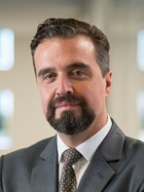Pablo Moscato
Un. Newcastle, Australia
Information-based Medicine and Combinatorial Optimization: Opportunities and Challenges
Date: Tuesday, July 5, 2016 - 14:30-16:00
Venue: Building CW, ground floor, Aula
View a short movie on Unlocking the Potential of Personalised Medicine with Computer Science
| Pablo Moscato | University of Newcastle, Australia |
|---|---|
| Prof. Pablo Moscato is an Australian Research Council Future Fellow and Professor of Computer Science at The University of Newcastle. At the California Institute of Technology (1988-89) he developed a methodology called "memetic algorithms" which is now widely used around the world in Artificial Intelligence, Data Science, and Business and Consumer Analytics.
Prof. Moscato is Founding Director of the Priority Research Centre for Bioinformatics, Biomarker Discovery and Information-based Medicine (2007-2015) and the Funding Director of Newcastle Bioinformatics Initiative (2002-2006) of The University of Newcastle. His expertise in Data Science was then essential for a large number of applied projects. He has been working in Applied Mathematics for 30 years, and in heuristic methods for Operations Research problems since 1985. His work and ideas have been highly influential in a large number of scientific and technological fields and his manuscripts have been highly cited. The journal "Memetic Computing" is largely dedicated to a methodology he championed (memetic algorithms). Every 48 hours a new published paper brings a novel application of these techniques. Due this work and his other contributions in the areas of classification and machine learning, Prof. Moscato is now well-respected around the world and he has become one of Australia's most cited computer scientists. |
|
| Information-based Medicine and Combinatorial Optimization: Opportunities and Challenges |
|---|
| Operations Research (OR) methodologies, as well as their practitioners, are in high demand. They can address new problems that arise from the disruptive technologies that will have the highest economic impact in the future. Disruption comes hand-in-hand with new technologies for Next-Gen Genomics, mobile internet, automation of knowledge work, the Internet of Things, the Cloud, Advanced robotics and Autonomous and near-autonomous vehicles. These areas bring great challenges but also great opportunities.
One spin-off that will change the world is that these new technologies will generate large-scale datasets allowing an unprecedented ability for OR practitioners to “personalise” solutions. One clear example comes from the field of Personalised Medicine which seeks to consider the best interests of the patient/individual at the centre of all decisions. Personalization will disrupt institutional practices, and drugs and treatments will necessarily be "tailored" to the individual profile. Obviously, one of these disruptive technologies (Next-gen Genomics) is a keystone for the changes ahead, but the automation of knowledge work will also prove vital for cost-effective decisions. The future of OR will be shaped by its new role as a nexus between disciplines. The interdisciplinary nature of this new area of large-scale data-driven decisions has led to the emergence of a new name for a field of research: Data Science. There are many challenges in this field and they generally involve large scale optimization. However, personalization brings a particular challenge: the development of new mathematical models and powerful algorithmic approaches for large scale instances. Based on the lessons we learned when introducing these new mathematical models, which were developed to provide new diagnostic and treatment methods, I will discuss our personal journey in Information-based Medicine, with examples of the application of techniques of Combinatorial Optimization, Artificial Intelligence, Machine Learning and Machine Teaching to the area of Data Science and Large-scale Data Analytics. |




